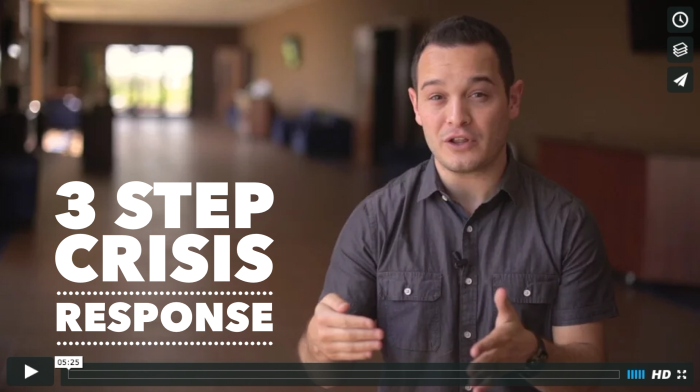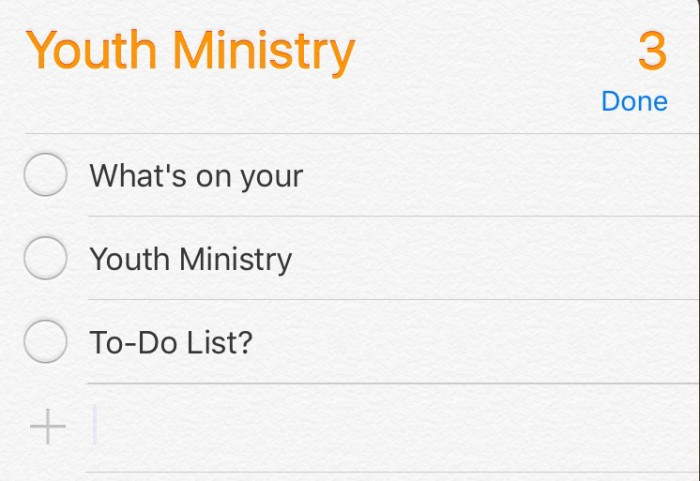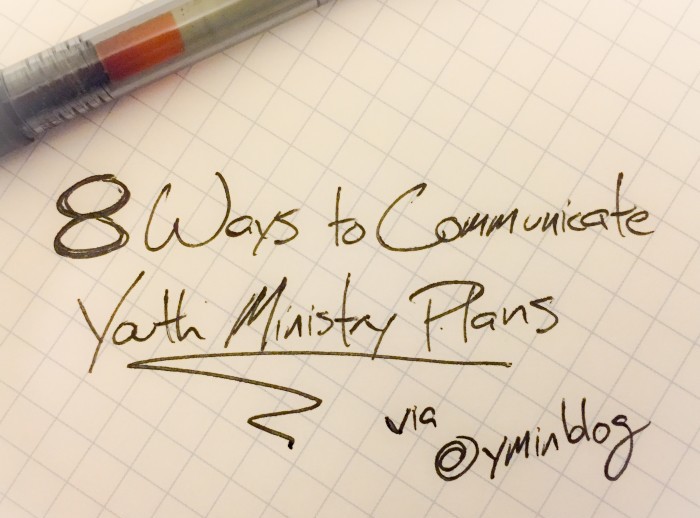by David Hanson | Jun 17, 2016 | On the Job, The Youth Ministry Blog
Summer is here and “Project Survive and Thrive” is in full effect. This season can be one filled with immense joy and solid ministry, but it can also be a dangerous season for youth pastors. Here are 4 warnings for summer in youth ministry.

1. Don’t sacrifice your soul for productivity.
As you run in a million directions to camps, retreats, mission trips, VBS, random hangouts, organized events, and weekly activities don’t sacrifice your relationship with Christ for productivity. While being everywhere at once and running non-stop until September seems like faithful ministry, a failure to prioritize your faith development and pursuit of Christ will damage your ministry in ways you’ll never know. Furthermore, the ministry that does take place will not be near as fruitful.
Response: Schedule your Quiet Time. What time of day can you be intentional? Pick a study or book that excites you. Partner with another youth pastor for accountability.
2. Don’t sacrifice your family to summer.
If I’m being honest, summers in youth ministry are the hardest on my marriage. Even after nine years of marriage while in youth ministry my wife and I find June and July to be the most straining on our marriage and family. How could it not be? I will be out of town/country 3-4 weeks and when I am in town, my time is consumed with the next youth event/Bible study/hangout.
Response: Calendar date nights and family nights and then honor the commitment. Plan a family vacation or get-away for August or September to refresh and reconnect.
3. More events doesn’t equate to a better ministry.
While some youth ministries scale up in the summer other youth ministries scale down. There is not right or wrong answer to this as it is completely dependent upon your context. In my context, we scale up, but this doesn’t include adding a ton of new stuff to the weekly calendar.
Rather than simply adding more activities, we scale up our regular events, and then pepper in a few Bible studies lead by our college interns. Adding more events to you calendar does not mean you are doing better ministry. In fact, adding more to your plate may cause attrition in the quality of your ministry. I would rather do a few things well than a lot of things mediocre.
Response: Have you planned to much? Do you need to scale back? Can you scale back? How will you focus on quality and stop worrying about quantity?
4. Don’t lose sight of your fall calendar.
Summer will fly by. You will look back two and a half months from now and wonder where the time went. If you fail to prepare for the fall, you will be scrambling when back to school arrives. My team is laying the ground work for our Fall Retreat and will use August to finalize the fall details. Furthermore, what does your communication to parents and students look like as you prepare for the new school year? What is your plan for Promotion Sunday? How will you re-launch and communicate your weekly events? Don’t let these things sneak up on you!
Response: Plan a brainstorming session with your team to talk through these details. Are you a lone ranger youth worker, start by building a team that can help you look ahead!
[guestpost]
David Hanson: Texas native, Texas Tech Red Raider, M.Div. at Truett Seminary, husband to Ashley, father to Ava, Ben & Madelyn, Student Pastor at The Fellowship in Round Rock, Tx, table tennis (ping-pong) extraordinaire, addicted to coffee. For anything else…you’ll just have to ask.
[/guestpost]

by David Hanson | Mar 31, 2016 | On the Job, The Youth Ministry Blog, Youth Ministry Videos
Question: Do your leaders know what to do if a student comes to them in a crisis? As I met with my Small Group Leaders over the past month, a common desire was to know how to respond to students walking through a difficult season. For this reason, I shot a video to cover our 3 Step Crisis Response. Check it out:
3 Step Crisis Response from The Fellowship Round Rock on Vimeo.
In this video I covered the three steps I want our Small Group Leaders to take when a student approaches them with a crisis situation.
- Clarify – Before jumping to conclusions or dismissing a statement as irrelevant, it’s important to clarify what a student is saying. Use phrases like: What do you mean? Explain that to me. What does that look like? This will ensure you are seeing and understanding what the student is actually telling you.
- Notify – When a student confesses that they are walking through a troubling time, it’s always the best bet to play it safe and relay the situation to a paid staff member. They will help you with your response and determine what steps need to be taken next. As a youth worker, you are a mandated reporter and must notify the appropriate authorities if a student confides that they are in harms way. When it doubt…notify the youth pastor!
- Follow-through – It doesn’t matter if the crisis situation was monumental catastrophe or a momentary unwarranted worry, you will earn the trust of students if you follow-through. In the follow-through you get to be pastoral and regardless of the situation, point them back to the love, grace, mercy, and comfort of Christ.
I hope this helps you think through how you are communicating with leaders and encourage you to steal this video or remake it yourself. Just give your leaders a plan for crisis situations!
Like what you read? Join our mailing list and I’ll send you a special bonus!
Sign-up & Send Me a Bonus!
[guestpost]
David Hanson: Texas native, Texas Tech Red Raider, M.Div. at Truett Seminary, husband to Ashley, father to Ava, Ben & Madelyn, Student Pastor at The Fellowship in Round Rock, Tx, table tennis (ping-pong) extraordinaire, addicted to coffee. For anything else…you’ll just have to ask.
[/guestpost]

by David Hanson | Mar 29, 2016 | On the Job, The Youth Ministry Blog
This past week, my team and I met at a local coffee shop to fill out our Summer Calendar. Our goal was to come up with “the fun” of the summer calendar. We naturally have our big blocks in place (ie. HS Camp, MS Camp, Mission Trip, serving at VBS, etc.), but wanted to come up with a list of things we could do on a Wednesday night or any random day of the week. Here’s what we got:

15 Fun Ideas for your Youth Ministry Summer Calendar
- Crud War – messy game involving chocolate syrup, ketchup, mustard, mayo (pretty much all condiments), shaving cream, dog food, or anything else that shouldn’t be rubbed into someone’s hair. Middle Schoolers love to get messy!
- Service Project – Everything you do this summer doesn’t need to revolve around fun. Set aside some days to get students giving back. These can be planned and impromptu. Tell a group of girls or guys you to clear their schedule, then take them to serve. You would be surprised how much this will bring your group together!
- Trampoline Park/Skate Park/Surfing – Where you live will regulate this, but our students love trampoline parks!
- Sand-volleyball Tournament
- Dodge ball Tournament – make a bracket, have them form team, and dress up thematically!
- Baseball Game – Is there a local baseball team or sports team? Have the students dropped off and picked up at the park, its easy!
- Pool Party – We do a Middle School Pool Party on Promotion Sunday for the incoming 6th graders. We put all the 6th grade guys at one house and the girls at another as not to overwhelm one persons house with 70 6th graders! This is easy for any grade or group!
- Movie Night – I prefer to pick a opening day movie during the summer and have the student meet me there. Once again, it’s easier if parents are the transportation! What’s coming out this summer? Click here to find out!
- PIE – People Interested in Eating – Pick a random restaurant where the students can meet you each week for lunch. Everyone has to eat, you might as well eat together and have some rich fellowship. Once again, transportation is on them. Announce on Sunday where you will eat on Monday at noon! They want to hang out with you…give them the chance!
- Paint War – This was a HUGE success last year, and we will kick-off the summer with a paint war again! Want to know what you need to pull this off? I did a huge write up on this last year, so go check it out here!
- Waterpark – Take a trip to Hawaiian Falls, Schlitterbahn, Wet-N-Wild, or whatever they call waterparks in your area! This might involve travel, but hopefully not!
- Giant Slip-N-Slide – Can’t make it to a waterpark? Why not make one yourself? A trip to Wal-Mart and Lowe’s or Home Depot for some tarps, painting plastic, shower curtains, pool floaties, baby oil, and dish soap can go A LONG WAY!
- Camping or Hiking – a day trip to a local national park or overnight camping at a state park can be a ton of fun. Older students love to get outdoors to hammock, enjoy nature, and make fires. You could make it intentional with a daily devotional or prayer time.
- Bowling – Who doesn’t love bowling? Okay maybe some people, but even my Middle Schoolers will play one round before darting to the arcade!
- Lake Day – Have a lake near you? Could you invite a church member to drive students around in their boat? Could you rent a boat or a party barge? This sounds crazy, but I really want to do it!
Others Receiving Votes:
- Video Game Night – different people/parents feel strongly for and against this…
- Park Day – soccer, kick-ball, basketball, ultimate Frisbee, flag football, etc.
- Bubble Soccer – better for large events, and costs $$$
- Coffee & Conversation – Pick a hard topic you want to discuss, then provide a time and place for those who want to dive deeper into something difficult with lots of discussion.
- Capture the Flag or an Ultimate Relay Race – Takes lots of planning, but can be great!
What did I leave off? What are some of the fun things you have planned this summer? What are the cheap and easy ideas you have…after all, we gotta protect the budget! Comment below!
Like what you read? Join our mailing list and I’ll send you a special bonus!
Sign-up & Send Me a Bonus!
[guestpost]
David Hanson: Texas native, Texas Tech Red Raider, M.Div. at Truett Seminary, husband to Ashley, father to Ava, Ben & Madelyn, Student Pastor at The Fellowship in Round Rock, Tx, table tennis (ping-pong) extraordinaire, addicted to coffee. For anything else…you’ll just have to ask.
[/guestpost]
by David Hanson | Mar 25, 2016 | On the Job, The Youth Ministry Blog
Here’s a question: What is the most fundamental faith message you are communicating to students/your kids? Note: What you are communicating might be different that what you want to communicate.

Far too often in my ministry with students I have communicated the wrong message. While I want to communicate: “Our Heavenly Father has lavished His grace upon us through the perfect life, death, and resurrection of Jesus and wants a relationship with us where we find our purpose, meaning, and work in Him.”
I have far too often communicated: “Jesus loves you, you should appreciate this by doing something, namely inviting others to church.”
This second message is void of four central elements. When you leave these four things out you are in danger of producing pious church attenders. (Pious – “characterized by a hypocritical concern with virtue or religious devotion; sanctimonious.”)
The four central elements left out are an understanding of grace, an emphasis on relationship, satisfaction in Him, and a mission (work) that proceeds from faith.
4 Reasons Students become Pious Church Attenders:
1. A misunderstanding of grace.
Yes, we want students to know that Jesus loves them, but if we fail to communicate that His grace was shown through the perfect life, death, and resurrection of Jesus, then we fail to help them understand the magnitude His grace. Furthermore, when students don’t understand the depth of their depravity, they will never fully appreciate the greatness of His grace. For if we are just a little bad, the then the grace of Jesus just has to be a little good. But if we are totally depraved, sinful at our core, and prone to wander, then the grace of Jesus that welcomes us back every time is huge, and almost unfathomable!
2. Their faith leans more toward religion than relationship.
Students who view God as a distant judge will fail to engage in a relationship with Christ. If God is simply a distant judge, then our actions, and church attendance for that matter, are what matter most. Students who don’t walk in a reciprocal relationship with Jesus miss the intimacy that God offers to His children.
3. That “He is most glorified in us when we are most satisfied in Him” (shout out to John Piper).
Outside of relationship, God is distant and cold. It’s hard to keep God preeminent in your life if He is void of love, joy, peace, patience, kindness, goodness, faithfulness, gentleness, and self-control. But if God is love and in our relationship with Him we are able to walk in all the fruits of the Spirit, then it’s easy for us to rejoice in Him. The cry of our hearts should be to glorify Jesus because we find utmost satisfaction in His presence; not from what He provides, but from Him. So many students miss this. They either fail to find full satisfaction in Him because He seems cold and distant or they find their satisfaction in the provisions rather than the provider.
4. They get the faith vs. works paradigm backwards.
Far too many students who have grown up in the church get the faith vs. works paradigm backwards…and it’s not necessarily their fault! Rather than understanding that our good works are an extension or overflow of our faith in Jesus, students believe that good works will earn them favor with Jesus. The behavior-reward cycle is something they have been taught from birth (i.e. If you behave you will get a cookie). This is why this cycle is hard to break in our relationship with Jesus!
It’s hard to grasp that Jesus already views us with favor and that His love for us is beyond measure. There is nothing we can do to earn favor with God outside of Jesus. Our belief in Jesus earns our standing and favor before God and our actions that reflect His kingdom should flow from that favored state.
What Now?
In your conversations with teens about God you cannot emphasize enough an understanding of grace, an emphasis on relationship, satisfaction in Him, and a mission (work) that proceeds from faith.
As an advocate for your child and other teenagers, be intentional in the ways you bring these topics into conversation. If you are a youth worker or small group leader, look for ways to work these elements into your study. Let’s make disciples, not church attenders.
There’s work to be done!
Like what you read? Join our mailing list and I’ll send you a special bonus!
Sign-up & Send Me a Bonus!
[guestpost]
David Hanson: Texas native, Texas Tech Red Raider, M.Div. at Truett Seminary, husband to Ashley, father to Ava, Ben & Madelyn, Student Pastor at The Fellowship in Round Rock, Tx, table tennis (ping-pong) extraordinaire, addicted to coffee. For anything else…you’ll just have to ask.
[/guestpost]
by David Hanson | Mar 21, 2016 | On the Job, The Youth Ministry Blog
Youth Ministry can be a difficult machine to manage. As a youth worker you will spend every week planning a Sunday and/or Wednesday service. It will take extra time and effort if you want to get out of the routine you’re stuck in and do something creative.
There are always sermons and small group lessons to write, students to meet up with, parents to talk to, leaders to encourage, and meetings to attend. Feel the pressure? Keep reading…

In addition to the weekly routine of youth ministry, there are goals we want to accomplish and dreams we want to come to fruition. These seeds of ambition, however, will never mature if we neglect to clearly identify them and lay down a game plan to accomplish them.
Clearly Identify Your Goals:
It didn’t take long for me to create a list of around twenty things I want to accomplish. But I paired this list down for my own clarity…and yours. Don’t make the list so long that it seems daunting and unattainable.
Stop what you are doing right now, and write down ten goals you want to accomplish. Here are mine:
- Recruit more Small Group Leaders
- Plan future training meetings
- Shoot training videos
- New branding for Wednesday Night
- Plan full HS/MS separation on Wednesday Nights
- Re-examine safety measures on Wednesday Nights
- Implement more service projects
- Provide more entry level adult service opportunities
- Plan next Parent Link Seminar
- Partner more strategically with Children’s ministry
Put It On The Calendar
I’ve heard many leadership guru’s say that “what get’s scheduled, gets done.” Don’t expect for time to magically appear. I’ve had very few moments in youth ministry where I’ve asked myself, “what should I do with this extra time?” Time tends to fill itself with something.
If you want to achieve your goals, start by picking a time a date. Block out a period of time that will not interrupted to scheduled over. Stop what you are doing right now, pull up your calendar, and set a date.
Congratulations! You have made progress and taken action. While it might not seem like much now, you are being faithful to the mission God has placed before you.
Like what you read? Join our mailing list and I’ll send you a special bonus!
Sign-up & Send Me a Bonus!
[guestpost]
David Hanson: Texas native, Texas Tech Red Raider, M.Div. at Truett Seminary, husband to Ashley, father to Ava, Ben & Madelyn, Student Pastor at The Fellowship in Round Rock, Tx, table tennis (ping-pong) extraordinaire, addicted to coffee. For anything else…you’ll just have to ask.
[/guestpost]
by David Hanson | Mar 17, 2016 | On the Job, The Youth Ministry Blog
Over the past week, I’ve had the amazing opportunity to meet with most of my High School Small Group Leaders (these people truly are the hands and feet of Jesus!).

The purpose of this meeting was to evaluate the health of our Small Groups and invite feedback concerning the student ministry. Below, I’ll share with you how I elicited feedback.
“Failed plans should not be interpreted as a failed vision. Visions don’t change, they are only refined. Plans rarely stay the same, and are scrapped or adjusted as needed. Be stubborn about the vision, but flexible with your plan.” – John C. Maxwell
To systematically evaluate our Small Groups and ministry at large, I used the SWOT analysis. According to Wikipedia, no one knows who created the model, but it’s been around since the ‘60’s. SWOT is an acronym for strengths, weaknesses, opportunities, and threats.
These categories are pretty straightforward, but given the fact that I’m in youth ministry, I like to change the “threats” category to “training.” Side Note: If you can think of actual “treats” to your youth ministry…focus on those before every evaluating your ministry! Ha!
Since we shouldn’t have any “threats” to our ministry, I changed the “t” to “training” and asked leaders where they would like to grow, where we could train them.
If you want to know the health of your ministry, the best thing you can do is meet with your leaders and ask them. You will be blown away by the response. Not only will you get valuable feedback that you can begin to take action on, but you will empower your leaders and remind them that they have a voice. If you trust leaders enough to invest in students, you should trust them enough to speak into your strategy and approach.
Will some of the feedback hurt? Absolutely. Do you need to hear it? Absolutely.
“Criticism may not be agreeable, but it is necessary. It fulfills the same function as pain in the human body. It calls attention to an unhealthy state of things.” – Winston Churchill
However, the feedback you receives will not only be negative. I felt like a million bucks leaving each meeting. My leaders were so encouraging and reminded me why I do what I do. They reminded me that true ministry is happening, that our Small Groups are working.
My encouragement to you is to set up a meeting with all your youth ministry volunteers this coming week. When you meet with them, fill out this SWOT Analysis. You will be blown away by the positive feedback, constructive criticism, and ideas that your leaders have!
Once you have all of that feedback, you know exactly where your time and attention need to go and you’ll be able to grow your ministry.
Get my SWOT Analysis
[guestpost]
David Hanson: Texas native, Texas Tech Red Raider, M.Div. at Truett Seminary, husband to Ashley, father to Ava, Ben & Madelyn, Student Pastor at The Fellowship in Round Rock, Tx, table tennis (ping-pong) extraordinaire, addicted to coffee. For anything else…you’ll just have to ask.
[/guestpost]
by David Hanson | Mar 7, 2016 | On the Job, The Youth Ministry Blog
Yesterday I wrapped up our annual series on love, sex, and dating with a focus on culture, temptation, and forgiveness. One of the central topics was pornography. Needless to say, I had every students attention.

In preparation for this message, I came across some pretty staggering statistics about teenagers and porn. I hope these help you process the state of the union as it pertains to your students online endeavors and leads you to more research and follow-through.
Did you know…
9 out of 10 boys are exposed to pornography before the age of 18.
The first exposure to pornography among men is 12 years old, on average.
71% of teens hide online behavior from their parents.
28% of 16-17 year olds have been unintentionally exposed to porn online.
20% of 16-year-olds and 30% of 17-year-oldshave received a sext.
On average…
6 out of 10 girls are exposed to pornography before the age of 18.
15% of boys and 9% of girls have seen child pornography.
69% of boys and 55% of girls have seen same-sex intercourse online.
“Never before in the history of telecommunications media in the United States has so much indecent (and obscene) material been so easily accessible by so many minors in so many American homes with so few restrictions.” – U.S. Department of Justice
Research reveals many systemic effects of Internet pornography that are undermining an already vulnerable culture of marriage and family. Even more disturbing is the fact that the first Internet generations have not reached full maturity, so the upper limits of this impact have yet to be realized” – Jill Manning, Sociologist
The average age of first exposure to Internet pornography is 11
70% of boys have spent more than 30 consecutive minutes looking at online pornography on at least one occasion.
35% of boys have done this on more than ten occasions.
When they talk about porn with friends, 89% of teens, and 95% of young adults say they do so in a neutral, accepting, or encouraging way. That is, only one in 20 young adults and one in 10 teens say their friends think viewing pornography is a bad thing.
32% say viewing porn is “usually or always wrong” compared to 56% who say not recycling is “usually or always wrong.”
And before we pass judgement as pastors and youth pastors, let’s look at this alarming statistic:
Most pastors (57%) and youth pastors (64%) admit they have struggled with porn, either currently or in the past.
Overall, 21% of youth pastors and 14% of pastors admit they currently struggle with using porn.
We have a problem folks. But we also have a great opportunity to talk with students about their identity in Christ. Condemning porn void of helping students be found in Christ is fruitless. May we help students run after Christ in such a way that “the things of earth will grow strangely dim in the light of his glory and grace.” Amen.
[guestpost]
David Hanson: Texas native, Texas Tech Red Raider, M.Div. at Truett Seminary, husband to Ashley, father to Ava, Ben & Madelyn, Student Pastor at The Fellowship in Round Rock, Tx, table tennis (ping-pong) extraordinaire, addicted to coffee. For anything else…you’ll just have to ask.
[/guestpost]
by David Hanson | Mar 2, 2016 | On the Job, The Youth Ministry Blog
As a youth worker, communication is key. We must consistently put our plans, schedules, and programs in front of parents. The view of your ministry will largely be determined by how well you communicate with parents.

A failure to communicate will lead parents to two conclusions: 1) You don’t have a plan. 2) You don’t care.
While these might be furthest from the truth, what good can come from a failure to communicate?
Moment of Honesty: I haven’t always been the best at consistent communication. In some seasons my team has thrived at communication and had parents and leaders commend our efforts. In other seasons, we have failed miserably at communication and had parents unsure what to even think about our ministry!
Regardless of your past performance, what matters most is how you move forward. Resolve to communicate clearly and consistently. If you want to win with parents you will need clear, concise (don’t over communicate), and consistent communication.
With that said, here are 8 Ways to Communicate Youth Ministry Plans:
- Student Ministry Stage Announcements – don’t expect students to tell their parents!
- A Parent Email or Newsletter – build a list using MailChimp…you’re welcome.
- The Adult Service Bulletin – only use for major events & have a presence over the course of multiple weeks…it’ll take that long for them to see it!
- Text Messages – Make a student list & a parent list. Want it free? Use Remind…you’re welcome again.
- Want the entire list? Get the Cheat Sheet…print it off, put it on your desk…you’re welcome again!
Get the Cheat Sheet
[guestpost]
David Hanson: Texas native, Texas Tech Red Raider, M.Div. at Truett Seminary, husband to Ashley, father to Ava, Ben & Madelyn, Student Pastor at The Fellowship in Round Rock, Tx, table tennis (ping-pong) extraordinaire, addicted to coffee. For anything else…you’ll just have to ask.
[/guestpost]
by David Hanson | Mar 1, 2016 | On the Job, The Youth Ministry Blog
On a mission trip, transformation and preparation go hand-in-hand. If you want to see transformation, preparation matters.

These were the words of Greg, my youth ministry elder, this past Sunday at our first meeting for our July trip to the Dominican Republic. Greg is right. Short-term mission trips are transformational for those who faithfully prepare.
As a youth pastor, I want to make every effort to prepare students for what they will experience and what they should expect on a mission trip. Furthermore, I want to make sure that my students are thinking intentionally about the purpose and function of short-term missions.
It’s my firm belief that short-term missions should be tied to a long-term mission. In other words, churches or groups looking to take a week-long trip should look to partner with someone who has boots on the ground for the long haul. A short-term mission team should seek to join and bless the mission of those who are seeking long-term transformation.
Furthermore, a mission team should spiritually, emotionally, and intellectually prepare for the trip. As a mission trip leader, I have no problem asking a lot from those who want to be a part of our mission team.
Mission Trip Requirements:
- 6 Mandatory Meetings
- 2 Required Readings
- 30 Day Devotional
- Fundraising
[shareable text=”Faithful preparation will open your eyes & hearts to what God wants to accomplish in & through your team. via @yminblog #youthmin #missions “]Faithful preparation will open your eyes and hearts to what God wants to accomplish in and through your team. #youthmin #missions TWEET THIS![/shareable]
Want to see our Deadlines and Meetings Schedule? Download it here.
Where are you going on mission this summer?
What do you do to prepare?
Comment below!
Mission Trip Meetings & Deadlines
[guestpost]
David Hanson: Texas native, Texas Tech Red Raider, M.Div. at Truett Seminary, husband to Ashley, father to Ava, Ben & Madelyn, Student Pastor at The Fellowship in Round Rock, Tx, table tennis (ping-pong) extraordinaire, addicted to coffee. For anything else…you’ll just have to ask.
[/guestpost]
by David Hanson | Feb 26, 2016 | On the Job, The Youth Ministry Blog
I wrestle with control. I like to control things…specifically in youth ministry. I would rather do something myself and know it will be done right than let someone else do it and it not turn out the way I planned.

One of my students leading our transition to worship.
However, when we open Scripture, we Jesus entrusting ministry to the disciples. Jesus came to be the perfect propitiation for our sin, but also to hand off ministry to a mixed bag of nuts. Every time the disciples seem to have it together, they have a concentration lapse and start arguing about who will be the greatest in the kingdom. Sound familiar?
If you are a youth pastor you have seen this. You have seen students demonstrate an amazing ability to faithfully do ministry. But then days later, those same students do something that makes you question their salvation…sigh.
But we can’t give up. We can’t completely take back the reins. We must continue to hand off ministry to students…it’s what Jesus did…it’s what He had to do so that the ministry of reconciliation would move forward.
I am always looking for ways to hand ministry of to students. Whether it be a Bible Study they are doing at their school, leading worship, or most recently for me…leading Wednesday programming. For the last two months, I have handed a large part of our Wednesday night programming to students. I have put the planning, preparation, and execution of our welcome, game/activity, and transition into worship into their hands.
I can’t even begin to describe how hard this has been for me. There have been times where I have wanted to barge onto the stage and grab the mic…but I let go…and God moved! Students thrive off of the energy and presence of other students on the stage.
Robert Coleman, is his classic text The Master Plan of Evangelism, describes the method Jesus used to hand off ministry to the disciples. Steps 5-7 of 8 give us the verbiage of demonstration, delegation, and supervision. These work perfect in describing how we should be handing off ministry to students.
Demonstration – Let students watch you do what you will ask them to do. The disciples watched the way Jesus taught, prayed, healed, and loved others.
Delegation – Give your students meaningful ministry that will help them develop leadership skills. Jesus in Mark 6:7 sent the disciples out 2-by-2 to do ministry. He entrusted them to do the things they had seen Him doing.
Supervision – Give your students feedback on the work they are doing. Help them continue to grow and develop their ministerial skills. In Mark 6:30, after going out 2-by-2, they return to Jesus for a debrief. Imagine what those conversations where like!
What does this look like in your ministry? Are you being too controlling? Are you demonstrating, delegating, and supervising? Are you giving youth ministry back to youth?
[guestpost]
David Hanson: Texas native, Texas Tech Red Raider, M.Div. at Truett Seminary, husband to Ashley, father to Ava, Ben & Madelyn, Student Pastor at The Fellowship in Round Rock, Tx, table tennis (ping-pong) extraordinaire, addicted to coffee. For anything else…you’ll just have to ask.
[/guestpost]











